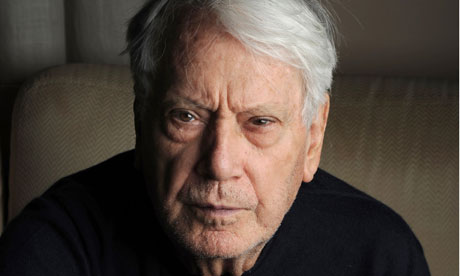
Jorge Semprún in 2010. He was interned by the Nazis and then hunted by Franco’s secret police.
Leader of the communist underground in 1950s Madrid, prize-winning 1960s screenwriter, minister in Spain's socialist government in the 1980s, and novelist and memorialist of deportation to a Nazi concentration camp, Jorge Semprún, who has died aged 87, was an outstanding participant in and witness of 20th-century Europe.
The experience of 18 months in Buchenwald, from 1943 to 1945, underlay all he thought and did. To the end of his life he suffered nightmares of the camp. His last public appearance, in April 2010, was to celebrate the 65th anniversary of the camp's liberation. He spoke then, on the same esplanade where he had seen people killed, of his belief in a united Europe rising from the ashes of Buchenwald's crematoria.
The fourth of seven children, Semprún was born in Madrid into an upper-class family. His maternal grandfather was the Conservative prime minister Antonio Maura. His mother died when he was eight. His father, a devout Catholic, became the Spanish republic's ambassador to the Netherlands. On the outbreak of the Spanish civil war, in 1936, the family fled.
Semprún was educated at the elite lycée Henri-IV in Paris and, from 1941, at the Sorbonne. In 1942 he joined the Spanish communist party in exile, but was arrested by the Gestapo in 1943 and deported. He survived Buchenwald because of his fluency in German and solidarity among the communist prisoners. After the second world war, he worked for six years as a translator for Unesco before in 1953 accepting the task of organising the banned Communist party in Madrid. Elegant and handsome, as "Federico Sánchez", Semprún became a legendary figure, remaining one step ahead of Franco's secret police. If anyone should doubt the danger, his replacement, when he was withdrawn in 1962, was Julián Grimau, who was arrested, tortured and executed the following year.
In 1964 Semprún, along with Fernando Claudín, was expelled from the Spanish Communist party. The pair thought that the exiled leaders were out of touch with the reality of capitalist development within the country. A few years later, the same leadership adopted much of Semprún and Claudín's critique in its turn to "Eurocommunism", though never acknowledged the fact.
On expulsion, Semprún had just completed his first and finest novel, the memoir of deportation Le Grand Voyage (1963; translated as The Cattle Truck). In this intense book, the five-day train journey frames memories of the narrator's past and future events in the camp.
In 1966 Semprún wrote the script for Alain Resnais's film La Guerre est Finie (The War is Over). He was to work again with Resnais on Stavisky (1974), but it was with the Greek director Constantin Costa-Gavras that he had his greatest film-writing success, Z. This story of a leftwing Greek politician, whose assassination was made to look like an accident, won the Jury prize at Cannes in 1969 and became a worldwide hit. He also wrote the script for Costa-Gavras's The Confession (1970), a critique of show-trials in Czechoslovakia.
In the 1960s Semprún published two other novels in French, L'Evanouissement (1967, The Fainting Fit) on the Nazi camps and La Deuxième Mort de Ramón Mercader (1969, The Second Death of Ramón Mercader), where he first tackles the experience of Stalinism. The most loyal of Stalinists in his youth, he moved further away from the creed with his first published work in Spanish, Autobiografía de Federico Sánchez (Autobiography of Federico Sánchez), an enthralling account of clandestine work that won Spain's Planeta prize in 1977. A number of other novels in French followed, exploring Stalinism and the Nazi camps.
Semprún's body of work became one of the great testimonies of the horrors of the 20th century and established his fame throughout Europe as an intellectual insisting on the need to explore the toughest truths. As in The Cattle Truck, his method is to take an event and then spring back to memories and then forward to the event's implications. Though fascinating because of their honesty and subject-matter, his novels suffer at times from over-reflection, slow plotting and baroque sentences.
Unexpectedly, in 1988 Semprún was called from his home in Paris to Madrid, to become minister of culture. He served in this post for three years, handling among other hot potatoes Salvador Dalí's controversial legacy. He published in 1993 Federico Sánchez Vous Salue Bien (Federico Sánchez Bids You Farewell), a remarkable account of his time as a minister. By far his funniest book, due to wicked anecdotes of the pettiness of other ministers, it was particularly rude about the deputy prime minister Alfonso Guerra, "a man with cultural pretensions". A year later, L'écriture Ou La Vie (1994; translated as Literature or Life) reconciled Semprún and Sánchez, the intellectual and the activist.
Semprún married three times: the first a brief marriage after the war; then in 1949 to the French actor Loleh Bellon, with whom he had a son, the post-situationist philosopher Jaime Semprún; and in 1963 to Colette Leloup, who died in 2007. Both Bellon and Jaime predeceased him. Semprún is survived by five children, Dominique, Ricardo, Pilar, Juan and Pablo, by his third wife.
• Jorge Semprún Maura, political activist, writer and politician, born 10 December 1923; died 7 June 2011
No comments:
Post a Comment